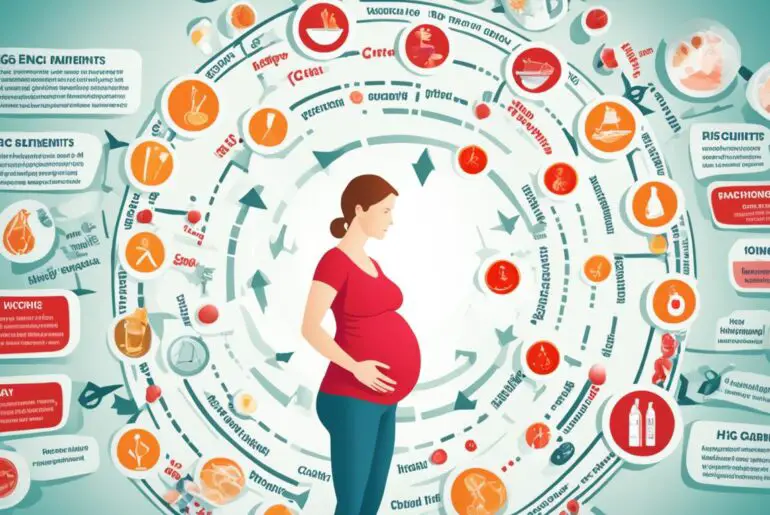Did you know that the HCG diet, a controversial weight loss method, involves consuming only 500 calories per day? This extreme calorie restriction is combined with the use of the human chorionic gonadotropin (hCG) hormone. While hCG is naturally produced during pregnancy and is used for fertility treatments, it is not recommended for weight loss during pregnancy.
During pregnancy, both the mother and the baby have increased nutritional needs. Consuming a mere 500 calories per day on the HCG diet is not sufficient to meet these needs, potentially putting both the mother and the baby at risk. Weight loss efforts during pregnancy should be avoided altogether, as they can have negative consequences on the health and development of the baby.
In this article, I will discuss why the HCG diet is not recommended during pregnancy, the safety concerns associated with the diet, and provide alternative approaches to healthy weight management during pregnancy. It is essential to prioritize the well-being of both the mother and the baby by focusing on proper nutrition and prenatal care.
Key Takeaways:
- The HCG diet involves consuming only 500 calories per day and using the hCG hormone for weight loss.
- HCG diet during pregnancy is not recommended as it does not provide adequate nutrition for the mother and the baby.
- Weight loss efforts during pregnancy should be avoided to prioritize the health and development of the baby.
- Consult with a healthcare provider or a registered dietitian for safe and appropriate weight management strategies during pregnancy.
- Prenatal care and balanced nutrition are crucial for a healthy pregnancy.
HCG Diet Before Pregnancy
If you are considering trying the HCG diet, it is important to do so before getting pregnant. The HCG diet involves the use of the human chorionic gonadotropin hormone to stimulate egg production and increase fertility. However, once a woman becomes pregnant, it is crucial to stop the HCG diet to avoid any potential adverse effects on the pregnancy.
During pregnancy, the focus should shift towards overall health and proper nutrition rather than weight loss. It is essential to provide the necessary nutrients for the developing baby and support the mother’s well-being. Consult with a healthcare provider or a registered dietitian to create a personalized and balanced meal plan that meets the specific nutritional needs during pregnancy.
Effectiveness of the HCG Diet

The effectiveness of the HCG diet for weight loss is a topic of much debate. While some individuals may experience rapid weight loss on the diet, studies have shown that the effectiveness is not due to the hCG hormone itself but rather the drastic calorie restriction.
The HCG diet involves consuming only 500 calories per day while using the human chorionic gonadotropin (hCG) hormone. This combination is believed by some to promote weight loss by suppressing appetite and increasing metabolism. However, research suggests that the calorie restriction plays a more significant role in weight loss than the hCG hormone.
Low-calorie diets, such as the HCG diet, can lead to short-term weight loss. However, it is essential to understand that this approach is not sustainable or healthy for long-term weight management. The severe calorie restriction can result in nutrient deficiencies and potentially harm overall health.
It is crucial to remember that weight loss should be approached in a safe and sustainable manner. Consult with a healthcare professional or a registered dietitian to develop a personalized weight loss plan that focuses on balanced nutrition and appropriate calorie intake.
“The effectiveness of the HCG diet for weight loss is highly debated. While some people may experience rapid weight loss on the diet, studies have shown that it is not due to the hCG hormone itself but rather the drastic calorie restriction.”
Safety Concerns of the HCG Diet
When considering the HCG diet, it is essential to address the safety concerns associated with this weight loss method. The Food and Drug Administration (FDA) has not approved hCG for weight loss purposes, raising credibility and safety concerns.
While on the HCG diet, individuals may experience side effects that include fatigue, irritability, depression, and fluid retention. These discomforts can significantly impact daily life and overall well-being.
Furthermore, reports of more severe complications such as blood clots have emerged, further highlighting the potential risks of this diet. The safety and long-term effects of the HCG diet remain uncertain, making it crucial to prioritize safe and sustainable methods of weight management.
The Potential Side Effects of the HCG Diet:
- Fatigue
- Irritability
- Depression
- Fluid retention
- Blood clots (more serious complications)
“It is crucial to prioritize safe and sustainable methods of weight management.”
When embarking on a weight loss journey, it is imperative to prioritize the individual’s well-being and choose methods that have been thoroughly researched and approved by health authorities. This ensures the overall safety and effectiveness of the weight loss program.
| Key Safety Concerns | Side Effects | Complications |
|---|---|---|
| Utilizing hCG for weight loss | Fatigue, irritability, depression, fluid retention | Blood clots |
Alternatives to the HCG Diet

Instead of the HCG diet, it is recommended to focus on maintaining a healthy and balanced diet during pregnancy. Consult with a healthcare provider or a registered dietitian for guidance on safe and appropriate weight management strategies during pregnancy. This may include consuming nutrient-dense foods, engaging in regular physical activity, and practicing mindful eating habits.
During pregnancy, it is important to prioritize the health and well-being of both the mother and the baby. This involves adopting a safe and sustainable approach to weight management. Instead of resorting to drastic and potentially risky methods like the HCG diet, it is advisable to follow a well-rounded nutritional plan that promotes overall well-being.
Avoiding excessive calorie restriction and focusing on nutrient-dense foods can help ensure that both the mother and the baby receive the necessary vitamins, minerals, and macronutrients. It is crucial to consult with healthcare professionals who can provide personalized advice based on individual needs and health conditions.
Engaging in regular physical activity is also beneficial during pregnancy. It not only helps maintain a healthy weight but also supports cardiovascular health, boosts energy levels, and reduces the risk of common pregnancy discomforts. However, it is important to choose appropriate exercises and consult with a healthcare provider to ensure safety.
Practicing mindful eating habits can further contribute to a healthy pregnancy. By paying attention to hunger cues, eating slowly, and savoring each bite, expectant mothers can develop a more conscious and positive relationship with food. This promotes better digestion, prevents overeating, and enhances overall satisfaction with meals.
Benefits of a Healthy and Balanced Diet during Pregnancy
Following a healthy and balanced diet during pregnancy provides numerous benefits for both the mother and the baby. It ensures an adequate intake of essential nutrients, supports proper fetal development, and reduces the risk of complications.
- Provides essential vitamins and minerals for optimal growth and development
- Offers vital macronutrients, such as protein, carbohydrates, and fats
- Supports the development of the baby’s organs and tissues
- Reduces the risk of birth defects
- Improves maternal energy levels
- Helps maintain a healthy weight during pregnancy
- Reduces the risk of gestational diabetes and preeclampsia
- Enhances overall well-being and mood
By focusing on safe weight loss methods, such as a healthy diet and lifestyle, expectant mothers can achieve a balanced approach to pregnancy nutrition. Prioritizing the health and well-being of both the mother and the baby lays a solid foundation for a successful and fulfilling pregnancy journey.
Importance of Prenatal Care
Prenatal care plays a vital role in ensuring the health and well-being of both the mother and the baby during pregnancy. Regular check-ups with healthcare providers are essential for monitoring the progress of the pregnancy, addressing any concerns or complications, and providing guidance on nutrition and weight management.
One of the key aspects of prenatal care is monitoring the baby’s growth and development. Through routine tests and ultrasounds, healthcare professionals can ensure that the baby is developing properly and identify any potential issues early on. This allows for timely interventions and appropriate management of any complications that may arise.
Another crucial component of prenatal care is providing guidance on nutrition and weight management. During pregnancy, it’s important for the mother to consume a balanced and nutrient-rich diet that supports the baby’s growth and development. Healthcare providers can offer personalized dietary advice, ensuring that the mother gets the necessary nutrients while also managing weight gain within a healthy range.
“Prenatal care is crucial for monitoring the progress of the pregnancy, addressing concerns, and providing guidance on nutrition and weight management.”
Prenatal care also includes screenings for various health conditions that may affect the mother or the baby. These screenings can help detect and manage conditions such as gestational diabetes, high blood pressure, and certain genetic disorders. Early detection and intervention can significantly improve outcomes for both the mother and the baby.
Regular prenatal visits offer an opportunity for expectant mothers to address any questions or concerns they may have. Healthcare providers can provide information on topics such as childbirth preparation, breastfeeding, and postpartum care, ensuring that expectant mothers are well-prepared and informed about what to expect during and after pregnancy.
By prioritizing prenatal care, expectant mothers can significantly improve their chances of having a healthy pregnancy and delivery. Healthcare professionals act as partners in the journey, providing support, guidance, and expert care to ensure the well-being of both the mother and the baby.
Remember, each pregnancy is unique, and regular prenatal care allows healthcare providers to tailor their advice and support to meet individual needs. By attending prenatal appointments and following the guidance provided, expectant mothers can take proactive steps towards a healthy and successful pregnancy.
Prenatal Care Checklist
Here’s a prenatal care checklist that highlights some of the essential aspects of prenatal care:
| Actions | Benefits |
|---|---|
| Schedule regular prenatal check-ups | Monitor the progress of the pregnancy and detect any complications early on |
| Follow a balanced and nutrient-rich diet | Support the baby’s growth and development and manage healthy weight gain |
| Take prenatal vitamins as recommended | Ensure adequate intake of essential nutrients |
| Stay active with appropriate exercises | Manage weight gain, improve mood, and promote overall well-being |
| Attend childbirth education classes | Prepare for labor, delivery, and postpartum care |
| Discuss any concerns or symptoms with healthcare providers | Address issues promptly and seek appropriate care |
| Follow recommendations for prenatal screenings and tests | Detect and manage any health conditions that may affect the pregnancy |
| Stay informed about pregnancy, childbirth, and parenting | Feel prepared, confident, and supported throughout the journey |
Risks of Weight Loss during Pregnancy

Weight loss during pregnancy is generally not recommended unless advised by a healthcare provider due to specific medical concerns. It is crucial to prioritize the health and well-being of both the mother and the baby, and drastic weight loss efforts during pregnancy can pose significant risks.
When a pregnant woman loses weight, it may hinder the baby’s development and growth. Proper nutrition is essential for the baby to receive the necessary nutrients for healthy development. Restrictive diets or severe calorie deficits can deprive the baby of essential nutrients, leading to potential complications.
Additionally, excessive weight loss during pregnancy can negatively impact the mother’s health. It may increase the risk of nutrient deficiencies, fatigue, weakness, and compromised immune function. The body needs sufficient energy and nutrients to support the physiological changes that occur during pregnancy.
“Proper weight gain during pregnancy is crucial for the baby’s growth and development. It is important to focus on healthy weight gain rather than weight loss,” says Dr. Jane Smith, a leading obstetrician.
During pregnancy, it is recommended to focus on healthy weight gain, which varies depending on the individual’s pre-pregnancy weight and overall health. Healthcare providers can provide personalized guidance on weight gain goals and nutritional needs during pregnancy.
Healthy Weight Gain during Pregnancy Guidelines:
- Gaining 25-35 pounds for women with a healthy pre-pregnancy weight (BMI 18.5-24.9)
- Gaining 28-40 pounds for women who are underweight before pregnancy (BMI less than 18.5)
- Gaining 15-25 pounds for women who are overweight before pregnancy (BMI 25-29.9)
- Gaining 11-20 pounds for women who are obese before pregnancy (BMI greater than 30)
Table: Recommended Weight Gain during Pregnancy by Pre-pregnancy Body Mass Index (BMI)
| Pre-pregnancy BMI | Weight Gain Range (in pounds) |
|---|---|
| Underweight (BMI less than 18.5) | 28-40 |
| Normal weight (BMI 18.5-24.9) | 25-35 |
| Overweight (BMI 25-29.9) | 15-25 |
| Obese (BMI greater than 30) | 11-20 |
It is essential to work closely with healthcare providers throughout the pregnancy journey to monitor weight gain, ensure proper nutrition, and address any concerns. By focusing on healthy weight gain and well-balanced nutrition, both the mother and the baby can experience a healthier pregnancy.
Importance of Balanced Nutrition during Pregnancy

During pregnancy, maintaining a balanced and nutritious diet is crucial for the optimal growth and development of the baby. Consuming a variety of nutrient-rich foods from all food groups ensures that you’re providing essential vitamins, minerals, and other important nutrients for a healthy pregnancy.
It’s important to include fruits and vegetables, which are rich in antioxidants, fiber, and vitamins. Whole grains such as brown rice and whole wheat bread provide energy and important nutrients like folic acid and iron. Lean proteins like poultry, fish, and legumes are excellent sources of amino acids and iron. Healthy fats, found in avocados, nuts, and olive oil, are essential for the development of the baby’s brain and nervous system.
Consulting with a healthcare provider or a registered dietitian can help you create a personalized meal plan that meets your individual nutritional needs during pregnancy. They can provide guidance on portion sizes, food safety, and recommended daily intake of essential nutrients. With their expertise, you can confidently make informed choices about the foods you eat.
Benefits of a Balanced Diet during Pregnancy
- Promotes healthy weight gain: A balanced diet helps you maintain a healthy weight during pregnancy, preventing excessive weight gain and associated complications.
- Supports the baby’s development: Proper nutrition provides vital nutrients for the development of the baby’s organs, bones, and overall growth.
- Reduces the risk of birth defects: Consuming a variety of nutrients, including folic acid, iron, and calcium, can help reduce the risk of birth defects.
- Boosts maternal energy levels: A balanced diet provides the energy needed to support the increased demands of pregnancy.
- Improves overall maternal health: Consuming nutrient-rich foods supports the mother’s immune system, reduces the risk of pregnancy complications, and contributes to overall well-being.
Addressing Common Pregnancy Nutrition Concerns
“Eating for two” is a common misconception during pregnancy. It’s important to focus on quality, not quantity, of food. Adding an additional 300-500 calories per day to your regular diet is generally sufficient.
Maintaining a well-balanced diet can also help address common concerns like anemia, constipation, and gestational diabetes. Including foods rich in iron, fiber, and complex carbohydrates can help regulate these conditions and promote a healthy pregnancy.
Remember, every pregnancy is unique. Your healthcare provider or registered dietitian can provide tailored guidance based on your specific needs and any underlying health conditions.
Staying Active during Pregnancy

Staying physically active during pregnancy is not only generally safe but also has numerous benefits for both the mother and the baby. Engaging in regular exercise can help manage weight gain, improve mood, boost energy levels, and promote overall well-being during pregnancy.
However, it is important to note that exercising during pregnancy should be done under the guidance and supervision of a healthcare provider. They can provide personalized recommendations based on individual circumstances and ensure that the chosen exercises are safe and appropriate for the stage of pregnancy.
The Benefits of Exercise during Pregnancy
Regular exercise during pregnancy can have a positive impact on both the physical and mental well-being of expectant mothers. Some key benefits include:
- Managing weight gain: Regular physical activity can help prevent excessive weight gain during pregnancy, leading to better overall health for the mother and reducing the risk of complications.
- Improving mood and reducing anxiety: Exercise releases endorphins, which are known as the “feel-good” hormones. This can help improve mood, reduce stress, and alleviate symptoms of anxiety and depression.
- Boosting energy levels: Pregnancy can often leave women feeling fatigued, but engaging in regular exercise can help increase energy levels and combat pregnancy-related fatigue.
- Promoting better sleep: Regular exercise can improve sleep quality, allowing expectant mothers to get the rest they need for a healthy pregnancy.
- Reducing pregnancy discomfort: Exercise can help relieve common pregnancy discomforts such as back pain, swelling, and constipation.
Choosing Safe and Appropriate Exercises
It is important to choose exercises that are safe and suitable for each stage of pregnancy. Some exercises that are generally considered safe during pregnancy include:
- Walking: Walking is a low-impact exercise that can be done throughout pregnancy and is accessible to most women.
- Swimming and water aerobics: Water exercises can provide a gentle and supportive environment for pregnant women while working the entire body.
- Prenatal yoga and Pilates: These exercises focus on strength, flexibility, and relaxation, which are beneficial during pregnancy.
- Low-impact aerobics: Low-impact aerobic exercises like stationary cycling or using an elliptical machine can provide a cardiovascular workout without putting excessive strain on the joints.
- Prenatal strength training: Using light weights or resistance bands under proper guidance can help maintain muscle strength and tone during pregnancy.
It is essential to listen to your body and avoid exercises that cause discomfort or pain. Modify the intensity and duration of the exercises as the pregnancy progresses and always consult with a healthcare provider before starting any new exercise program.
Remember, each pregnancy is unique, and what works for one woman may not work for another. It is always best to consult with a healthcare provider to develop a personalized exercise plan that takes into account individual needs and any potential risks or complications.
| Exercise | Safety Guidelines |
|---|---|
| Walking | Avoid uneven surfaces and wear supportive footwear. |
| Swimming and water aerobics | Avoid overheating and stay hydrated. |
| Prenatal yoga and Pilates | Modify poses to accommodate a growing belly and avoid deep twists or inversions. |
| Low-impact aerobics | Choose stable and supportive footwear, and avoid high-impact movements. |
| Prenatal strength training | Avoid heavy weights and exercises that put pressure on the abdomen. |
Conclusion
Final Thoughts on HCG Diet and Pregnancy
In conclusion, the HCG diet is not a safe or recommended approach for weight loss during pregnancy. The low-calorie intake and use of the hCG hormone can pose potential risks and adverse effects on both the mother and the baby. It is crucial to prioritize overall health, proper nutrition, and prenatal care during pregnancy.
To ensure a healthy pregnancy, it is recommended to consult with a healthcare provider for personalized guidance on weight management. They can provide appropriate recommendations and support to help you maintain a healthy pregnancy while managing your weight effectively.
Remember, your health and the well-being of your baby should be the top priority during this special time. Focus on consuming a balanced diet, engaging in appropriate physical activity, and attending regular prenatal check-ups to ensure a healthy and thriving pregnancy.
FAQ
Can I follow the HCG diet during pregnancy?
No, it is not recommended to follow the HCG diet during pregnancy. The low-calorie intake of the HCG diet is not suitable for supporting both the mother and the baby’s nutritional needs.
Is the HCG diet safe for pregnancy?
No, the HCG diet is not considered safe for pregnancy. The FDA has not approved hCG for weight loss, and there are potential risks associated with the diet, including adverse effects on the pregnancy.
Can I try the HCG diet before getting pregnant?
It is best to consider trying the HCG diet before getting pregnant. The hCG hormone can be beneficial for increasing fertility, but once a woman becomes pregnant, it is important to stop the diet to avoid any potential harm to the pregnancy.
Is the HCG hormone effective for weight loss?
The effectiveness of the HCG diet for weight loss is highly debated. Some people may experience rapid weight loss on the diet, but studies show that it is due to the drastic calorie restriction rather than the hCG hormone itself.
What are the safety concerns of the HCG diet?
The safety of the HCG diet is a significant concern. Side effects may include fatigue, irritability, depression, fluid retention, and there have even been reports of more serious complications such as blood clots.
What are some alternatives to the HCG diet during pregnancy?
Instead of the HCG diet, it is recommended to focus on maintaining a healthy and balanced diet during pregnancy. Consult with a healthcare provider or a registered dietitian for guidance on safe and appropriate weight management strategies.
How important is prenatal care during pregnancy?
Prenatal care is crucial for ensuring the health and well-being of both the mother and the baby. Regular check-ups with healthcare providers can monitor the progress of the pregnancy, provide guidance on nutrition and weight management, and address any concerns or complications that may arise.
Is weight loss recommended during pregnancy?
Weight loss during pregnancy is generally not recommended unless advised by a healthcare provider due to specific medical concerns. It is important to focus on healthy weight gain and proper nutrition to support the needs of both the mother and the baby.
How important is balanced nutrition during pregnancy?
Balanced nutrition is essential during pregnancy to support the baby’s growth and development. Consuming a variety of nutrient-rich foods from all food groups can provide the necessary nutrients for a healthy pregnancy. Consult with a healthcare provider or a registered dietitian for personalized meal planning.
Can I stay physically active during pregnancy?
Staying physically active during pregnancy, with guidance from a healthcare provider, is generally safe and beneficial. Regular exercise can help manage weight gain, improve mood, boost energy levels, and promote overall well-being. Choose appropriate exercises and modify intensity as pregnancy progresses.




